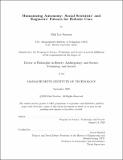Humanizing autonomy : social scientists' and engineers' futures for robotic cars
Author(s)
Stayton, Erik Lee.
Download1227095115-MIT.pdf (19.63Mb)
Other Contributors
Massachusetts Institute of Technology. Program in Science, Technology and Society.
Advisor
David Mindell.
Terms of use
Metadata
Show full item recordAbstract
Highly automated cars -- unlike robots in factories -- must operate in existing social spaces, which are complex and hard to control. Unlike household robots, these systems are also fast and dangerous. The fundamental problem of getting robots to interact in the world will be getting them to do the "right thing" -- according to developers, users, and societies. But what is "right" is a matter of perspective, and there will be many ways to achieve any particular robotic performance. Through ethnographic fieldwork at a site of robotic vehicle development, I investigate alternative strategies for robotic cars and discuss their social implications. Supported by a framework from multispecies ethnography and the practices of robot developers, I argue that robots do not see like humans or experience the world as humans do. But they must be explicitly made to think -- to represent the world and act in it -- in ways that work for people, and obey people's intersubjective assumptions about how robots will act in a given moment. Faced with this difficult set of design constraints, developers seek to humanize robots to make them socially acceptable, or robot-proof the world to make it safer for robots, through four idioms or strategies of heterogeneous engineering: mapping and annotating, perceptual omniscience, AI decision-making, and human-in-the-loop supervised operation. Social scientists involved in the design process challenge and complicate these four approaches, and introduce a fifth one: humanizing robots by allowing them to communicate via external human-machine interfaces. These idioms form a language by which to characterize approaches to socially integrated robotic systems. The debates between them show that different humanizing idioms imply different perspectives on social order, what it takes to be a competent social actor, and how humans and machines can work together. Each idiom imagines different kinds of future worlds in which robotic technologies come to coexist with humans, with vastly different political consequences. Social scientists are vital participants in the project of exploring the contours of these futures, and I suggest new approaches and open questions for the development of social scientists' engagement in technology development.
Description
Thesis: Ph. D. in History, Anthropology, and Science, Technology and Society (HASTS), Massachusetts Institute of Technology, Program in Science, Technology and Society, September, 2020 Cataloged from PDF version of thesis. Includes bibliographical references (pages 376-398).
Date issued
2020Department
Massachusetts Institute of Technology. Program in Science, Technology and SocietyPublisher
Massachusetts Institute of Technology
Keywords
Program in Science, Technology and Society.